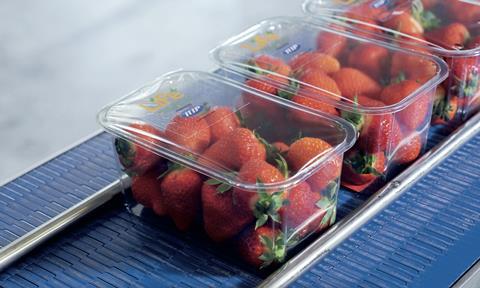Business development and marketing director Roberto Zanichelli tells Eurofruit that sustainability and the circular economy are central to the Italian company’s thinking
What recent developments or innovations have you been working on at Ilip that you can tell us about?

Roberto Zanichelli: Our commitment to the circular economy passes through the T2T r-PET strategy, which stands for ‘tray to tray’ in recycled PET – that is, r-PET trays produced by recycling other r-PET or post-consumer PET trays. Our goal is to close the circle, that is to have closed cycles of production and entry of secondary raw materials.
With our EcoDesign Reduce programme we are committed to cutting the use of plastic materials by reducing the thickness and weight of packaging, without compromising its performance. ‘Reduce’ is one of Ilip’s ‘3 Rs’ in its approach to environmental responsibility, together with ‘Recycle’, as in PET, and ‘Renewable resources’, with the use of bioplastics (PLA) as an alternative to polymer fossils.
Have any new Ilip packaging products been introduced to the market?
RZ: One example is the B40ECO, the 16g heat-sealable punnet in 92 per cent r-PET, which recently obtained an environmental product declaration update showing an improvement in the reduction of its climate footprint by 36 per cent. This is equivalent to 27kg less Co2 per 1,000 punnets.
Another is the ezy:split, the first hybrid punnet in r-PET and cardboard, which is 40-45 per cent lighter in its plastic component. This facilitates the separation of the latter from the cardboard to improve recycling and allows for wide possibilities in terms of brand communication.
What demands are you seeing from the marketplace?
RZ: Sustainability is central. The end user is increasingly attentive to issues related to environmental sustainability. The user prefers products made of renewable or recycled materials, or compostable with certification.
Ilip has been prepared for this epochal turning point as it has been producing r-PET products and has been in compostable bioplastics since 2001.
How have some of the current global challenges affected your operations?
RZ: The Covid-19 pandemic made food safety and hygiene a key industry-shaping trend for packaging. The need for greater protection and hygiene in food has meant a major rise in demand for plastic packaging. Moreover, the demand for pre-packaged products, which the consumer sees as having a longer shelf-life than bulk products, has grown as well.
Sales of containers, packaging and accessories for the home delivery of ready food have also risen. The increase in production cannot, however, compensate for the decline in turnover suffered on disposable tableware.
Although we are integrated with recycling, the purchase prices of bales of post-consumer PET bottles at auction have increased significantly due to the increased demand for r-PET for the production of water bottles with high recycled content. But the greatest criticality is the rise in energy costs.



